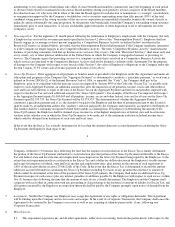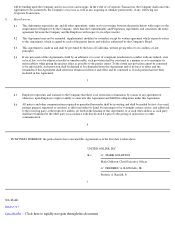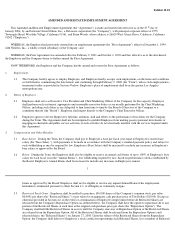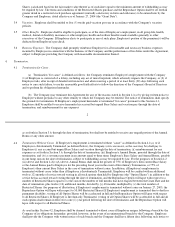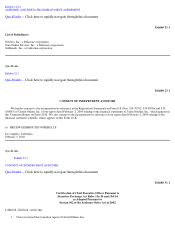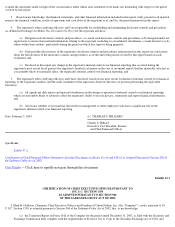Classmates.com 2003 Annual Report Download - page 86
Download and view the complete annual report
Please find page 86 of the 2003 Classmates.com annual report below. You can navigate through the pages in the report by either clicking on the pages listed below, or by using the keyword search tool below to find specific information within the annual report.
cure such breach. As used in this Section 4.2, Employee shall be deemed "Involuntarily Terminated" if (i) the Company or any
successor to the Company terminates Employee's employment without cause in connection with or following a Corporate
Transaction; or (ii) in connection with or following a Corporate Transaction there is (a) a decrease in Employee's title or
responsibilities (it being deemed to be a decrease in title and/or responsibilities if Employee is not offered the position of
Executive Vice President and Chief Marketing Officer of the Company or its successor as well as the acquiring and ultimate
parent entity, if any, following the Corporate Transaction), (b) a decrease in pay and/or benefits from those provided by the
Company immediately prior to the Corporate Transaction or (c) a requirement that Employee re-locate out of the greater Los
Angeles metropolitan area. "Corporate Transaction" shall mean: (a) a change in ownership or control of the Company effected
through the acquisition, directly or indirectly, by any person or related group of persons (other than the Company or a person
that directly or indirectly controls, is controlled by, or is under common control with, the Company), of beneficial ownership
(within the meaning of Rule 13d-3 of the 1934 Act) of securities possessing more than fifty percent (50%) of the total combined
voting power of the Company's outstanding securities; (b) a change in the composition of the Board over a period of thirty-six
(36) consecutive
3
months or less such that a majority of the Board members ceases, by reason of one or more contested elections for Board
membership, to be comprised of individuals who either (A) have been Board members continuously since the beginning of such
period or (B) have been elected or nominated for election as Board members during such period by at least a majority of the
Board members described in clause (A) who were still in office at the time the Board approved such election or nomination;
(c) a merger, consolidation or reorganization approved by the Company's stockholders, unless securities representing more than
fifty percent (50%) of the total combined voting power of the voting securities of the successor corporation are immediately
thereafter beneficially owned, directly or indirectly and in substantially the same proportion, by the persons who beneficially
owned the Company's outstanding voting securities immediately prior to such transaction; or (d) any stockholder-approved
transfer or other disposition of all or substantially all of the Company's assets.
5. Noncompetition
. For the eighteen (18) month period following the termination of Employee's employment with the Company (but only
if Employee has received the severance payments specified in Section 4.2 above) (the "Noncompetition Period"), Employee shall not
directly engage in, or manage or direct persons engaged in, a Competitive Business Activity (as defined below) anywhere in the
Restricted Territory (as defined below); provided, that the Noncompetition Period shall terminate if the Company terminates operations
or if the Company no longer engages in any Competitive Business Activity. The term "Competitive Business Activity" shall mean the
business of providing consumers with dial-
up Internet access services (free or pay). The term "Restricted Territory" shall mean each and
every county, city or other political subdivision of the United States in which the Company is engaged in business or providing its
services. The Company agrees that providing services to a company or entity that is involved in a Competitive Business Activity but
which services are unrelated to the Competitive Business Activity shall not be deemed a violation of this Agreement. For the purposes
of damages to the Company with respect to any breach of this Section 5, the value of Employee's obligations to the Company under this
Section 5 equals 37.5% of the cash severance payment in Section 4.2(iv) above.
6. Gross-Up Payment . If the aggregate of all payments or benefits made or provided to the Employee under this Agreement and under all
other plans and programs of the Company (the "Aggregate Payment") is determined to constitute a "parachute payment," as such term is
defined in Section 280G(b)(2) of the Internal Revenue Code of 1986, as amended (the "Code"), the Company shall pay to the
Employee, prior to or coincident with the time any excise tax imposed by Section 4999 of the Code (the "Excise Tax") is payable with
respect to such Aggregate Payment, an additional amount that, after the imposition of all penalties, income, excise and other federal,
state and local taxes thereon, is equal to the sum of the Excise Tax on the Aggregate Payment and interest and penalties imposed with
respect to the Excise Tax and such additional amount (the "Gross-Up Payment"). For example, if the Excise Tax imposed with respect
to the Aggregate Payment equals $1,000,000 and all penalties, income, excise and other federal, state and local taxes on the Gross-Up
Payment equal $2,333,333, the Gross-Up Payment will be $3,333,333. The determination of whether the Aggregate Payment
constitutes a parachute payment and, if so, the amount to be paid to the Employee and the time of payment pursuant to this Section 6
shall be made by an independent auditor (the "Auditor") selected and paid by the Company and reasonably acceptable to the Employee.
The Auditor shall be a nationally recognized United States public accounting firm. For purposes of determining the amount of the
Gross-Up Payment, the Employee shall be deemed to pay income tax at the highest marginal rates of federal, state and local income
taxation in the calendar year in which the Gross-Up Payment is to be made, net of the maximum reduction in federal income taxes
which could be obtained from deduction of such state and local taxes.
4
In the event that the Excise Tax is finally determined to be less than the amount taken into account hereunder in calculating the Gross-
Up Payment, the Employee shall repay to the Company, within five (5) business days following the time that the amount of such
reduction in the Excise Tax is finally determined, the portion of the Gross-Up Payment attributable to such reduction plus that portion
of the Gross-Up Payment attributable to the Excise Tax and federal, state and local income and employment taxes imposed on the
Gross-Up Payment being repaid by the Employee, to the extent that such repayment results in a reduction in the Excise Tax and a
dollar
-
for
-
dollar reduction in the Employee's taxable income and wages for purposes of federal, state and local income and employment




